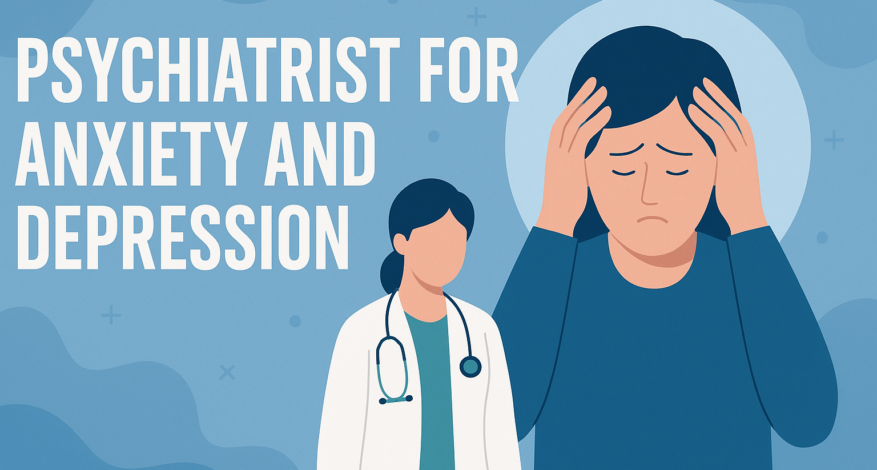10 Practical Ways to Improve Mental Health and Emotional Well-Being
Mental health is an essential part of overall well-being. According to the National Institute of Mental Health (NIMH), nearly 1 in 5 adults in the U.S. lives with a mental illness. Conditions like anxiety, depression, and stress-related disorders can interfere with relationships, work, and physical health. The good news is that there are effective ways to strengthen emotional resilience and promote long-term mental health.
In this article, we’ll explore 10 evidence-based practices that anyone can adopt to improve mental health and well-being.
Table of Contents
- 1. Prioritize Sleep
- 2. Stay Physically Active
- 3. Nourish Your Body with Healthy Nutrition
- 4. Build Strong Social Connections
- 5. Practice Mindfulness and Stress Management
- 6. Limit Alcohol and Avoid Substance Misuse
- 7. Seek Professional Support Early
- 8. Explore Telepsychiatry Options
- 9. Find Meaning and Purpose
- 10. Know When to Seek Urgent Help
10 Practical Ways to Improve Mental Health and Emotional Well-Being
1. Prioritize Sleep
Sleep plays a fundamental role in regulating mood, memory, and stress response. Research shows that people with chronic sleep issues are significantly more likely to experience depression and anxiety. The
NIMH
recommends 7–9 hours of sleep each night for optimal brain function.
Simple steps such as keeping a regular bedtime, avoiding late-night screen time, and creating a calming evening routine can improve sleep quality and emotional stability.
2. Stay Physically Active
Exercise is one of the most powerful tools for mental health. Physical activity increases endorphins, reduces stress hormones, and boosts self-esteem. A study in
The Lancet Psychiatry
found that people who exercise regularly experience fewer days of poor mental health compared to those who are inactive.
Even moderate activities like walking, cycling, or swimming can improve mood and reduce symptoms of anxiety and depression.
3. Nourish Your Body with Healthy Nutrition
Diet and mental health are closely linked. Diets rich in fruits, vegetables, whole grains, and omega-3 fatty acids have been shown to support brain health. Conversely, diets high in sugar and processed foods can increase inflammation and worsen mood disorders. The
Harvard Health Blog
emphasizes that what you eat directly affects how you feel and think.
4. Build Strong Social Connections
Loneliness is considered as harmful as smoking 15 cigarettes a day, according to research cited by the
American Psychological Association (APA).
Strong relationships act as a protective factor against stress, anxiety, and depression. Meaningful connections — whether with friends, family, or support groups — provide emotional comfort and resilience.
5. Practice Mindfulness and Stress Management
Mindfulness meditation, yoga, and breathing exercises help calm the nervous system and improve focus. A
JAMA Internal Medicine
review found that mindfulness-based stress reduction programs significantly decrease symptoms of anxiety and depression.
Even a few minutes of daily practice can have lasting benefits for emotional health.
6. Limit Alcohol and Avoid Substance Misuse
Alcohol and drugs may provide temporary relief but worsen symptoms in the long run. Alcohol is a depressant that can intensify sadness, while drug misuse often leads to dependency and further emotional struggles. Choosing healthy coping mechanisms instead of substances is crucial for long-term well-being.
7. Seek Professional Support Early
Sometimes self-care strategies aren’t enough. When symptoms persist for more than two weeks, it may be time to consult a professional. Psychiatrists and therapists provide accurate diagnoses and evidence-based treatment plans. Early intervention leads to better recovery outcomes and prevents conditions from worsening.
Learn more about our mental health services designed to support patients at every stage of recovery.
8. Explore Telepsychiatry Options
Telepsychiatry has revolutionized mental health care by making it more accessible. Patients can now meet with providers virtually, reducing barriers such as travel time or mobility issues. A
JMIR Mental Health study
showed that patients reported high satisfaction with telepsychiatry, citing convenience and privacy as major benefits.
At My Psychiatrist, we offer secure telepsychiatry appointments to make care more convenient.
9. Find Meaning and Purpose
Having a sense of purpose contributes to resilience and life satisfaction. Purpose can come from work, creative pursuits, volunteering, or caring for loved ones. People with a strong sense of meaning report lower stress levels and higher emotional well-being.
10. Know When to Seek Urgent Help
If you or someone you know is experiencing thoughts of self-harm or suicide, immediate help is essential. In the U.S., dial 988 to reach the Suicide & Crisis Lifeline, available 24/7 for free, confidential support.
Taking the First Step
Improving mental health is not about perfection but progress. Small, consistent changes — paired with professional care when needed — create long-lasting improvements. By prioritizing sleep, building connections, and seeking help early, anyone can take meaningful steps toward better well-being.
About Us – My Psychiatrist
At My Psychiatrist, we are dedicated to providing evidence-based psychiatric care, including treatment for anxiety, depression, ADHD, bipolar disorder, and more. Our approach combines therapy, medication management, and innovative treatments like TMS (Transcranial Magnetic Stimulation).
We offer both in-person and telepsychiatry appointments. We are currently accepting new patients. Contact us today to schedule your appointment and take the first step toward improved mental health and well-being.



